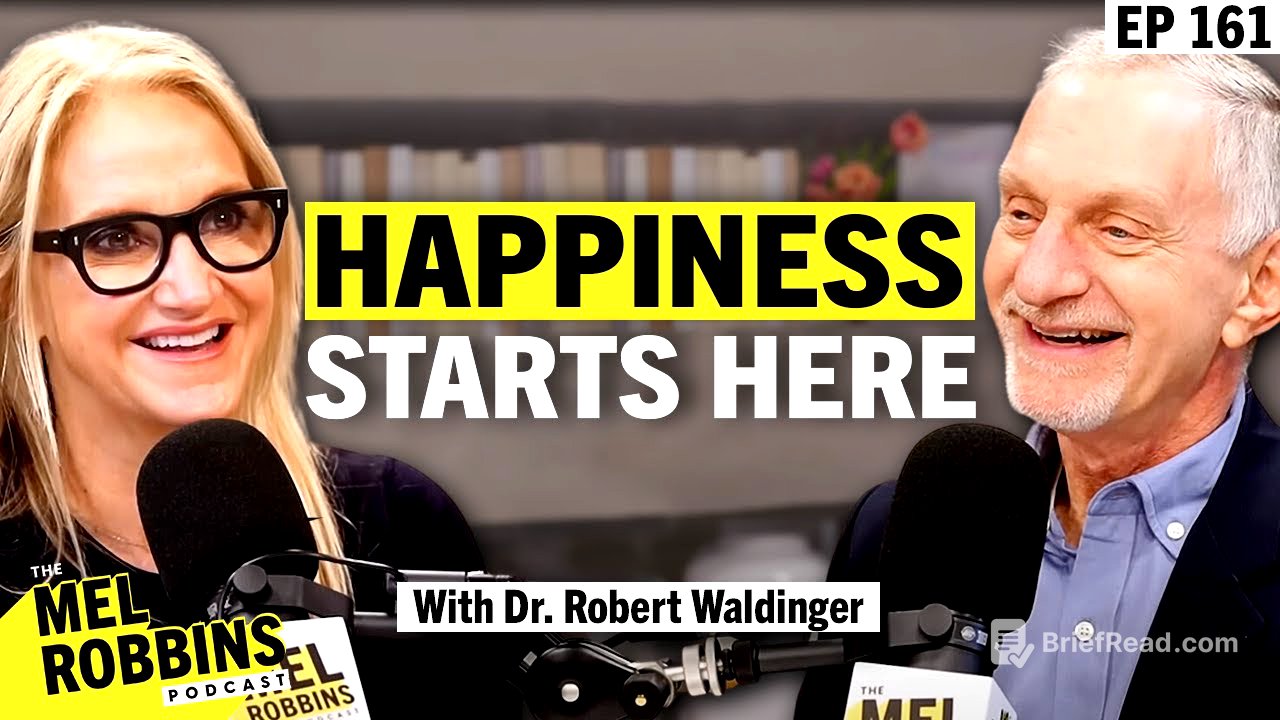TLDR;
Mel Robbins interviews Dr. Robert Waldinger, director of the Harvard Study of Adult Development, the longest study ever done on happiness. The key takeaway from the 86-year study is that good relationships are the strongest predictor of a long, healthy, and happy life. The conversation explores the surprising ways relationships impact physical health, strategies for dealing with loneliness and improving connections, and the importance of prioritizing relationships over societal measures of success like wealth and career achievements.
- Good relationships are key to a long, healthy, and happy life.
- Loneliness can be addressed by recognizing it as a signal for connection and taking small steps to engage with others.
- Prioritizing relationships and kindness leads to a more fulfilling life than chasing wealth or achievements.
What IS the Harvard Study of Adult Development? [7:26]
The Harvard Study of Adult Development began in 1938 with two groups: Harvard undergraduates and boys from Boston's poorest families. The study aimed to identify factors that help people thrive from adolescence into adulthood. Researchers conducted medical exams, psychological interviews, and home visits, noting details about family life and followed participants for decades, using questionnaires, in-home interviews, and medical records. Over time, the study incorporated new scientific techniques like DNA analysis and MRI scans to examine the impact of various factors on well-being.
The biggest and surprising takeaway from this study. [12:03]
The study's biggest takeaway is that individuals with more and warmer relationships live longer, stay healthier, and are happier. The surprising element was that relationships not only improve happiness but also keep people physically healthier, reducing the likelihood of diseases like coronary artery disease and type 2 diabetes. Good relationships regulate stress, allowing the body to calm down after stressful events, while a lack of these relationships keeps the body in a constant state of fight-or-flight, leading to health issues.
What was the strongest predictor of health at age 80? [14:38]
The strongest predictor of health and happiness at age 80 was the happiness in their relationships at age 50, not cholesterol levels. This finding was consistent across multiple studies, solidifying it as a scientific truth.
Causes of loneliness and how to feel connected again. [17:07]
Loneliness stems from feeling less connected than desired, even when surrounded by people. It's a signal for connection, similar to hunger or thirst, rather than a personal failing. To combat loneliness, stop blaming yourself or others and acknowledge the need for connection. Toxic or abusive relationships should be avoided, while other relationships may require effort to resolve disagreements. Accepting others and working through differences can lead to better understanding and stronger bonds.
The #1 strategy for couples who don’t feel connected. [20:36]
For couples feeling disconnected, a simple step is to express feelings of loneliness and a desire for reconnection. Instead of blaming, make positive suggestions for spending more time together, such as going for a walk or planning a dinner date. Addressing social anxiety through books, therapy, or trusted friends can also help. The quickest way to make friends is to engage in activities you love alongside others, creating shared interests and conversation starters.
Remember THIS when you’re trying to make new friends. [24:27]
When making new relationships, remember that not every interaction will be successful, and that's okay. Think of it like batting in baseball, where hitting the ball one out of three times is considered excellent. Most people will respond kindly, but don't be discouraged if someone doesn't.
Mel shares what was happening in her life at 27 years old. [26:41]
The "mini Harvard study" involves reflecting on how one's view of life changes over time. Mel shares a photo of herself at 27, engaged and focused on building a life with her husband and making money. Now, relationships with her husband, children, friends, and family are most important. She no longer feels the gripping anxiety she felt at 26 and is focused on enjoying life.
The advantage to getting older. [29:05]
As people get older, they appreciate life more and worry less about superficial things. The reality of life being short makes people happier as they savor life and pay attention to what's truly important.
What do we get wrong about happiness? [31:28]
People often chase what the culture tells them will bring happiness, such as buying certain products or achieving career milestones, but these things don't actually lead to happiness. Life is an ongoing process of change, and relationships and happiness are never constant. It's important to recognize this and work with the challenges that come along the way.
What does money have to do with happiness? [40:31]
Having basic needs met is vital for happiness; food security, shelter, and healthcare are essential. However, making significantly more money beyond meeting those needs doesn't increase happiness. Money should be viewed as a tool, not the point of life, to create connections and experiences. Studies show that spending money on experiences leads to greater and longer-lasting happiness than buying material things.
How do we stop comparing ourselves? [46:14]
Comparison is the thief of joy. People who frequently compare themselves to others are less happy. To stop comparing, limit exposure to situations that trigger comparison, such as social media.
How to find happiness when you’re in your 20’s. [48:29]
For 20-year-olds, who have grown up with constant exposure to others' lives on social media, it's important to spend time in real life, away from phones, engaging in activities they love. Video games, for example, can provide a state of flow and connection with friends, offering a break from social media comparison.
What kind of relationships do you NEED to have a good life? [56:52]
Everyone needs a "Bedrock relationship" – someone who "has your back," a secure attachment where you feel supported and loved. This secure attachment provides a home base, allowing individuals to take risks and explore the world, knowing they have someone to return to for support.
What will help you get the most out of life? [1:02:12]
Feeling like you're not alone is vital for managing stress. Feeling like someone will catch you if you fall and feeling like you belong are important. Small interactions, like a nice exchange with a barista, can help us feel connected and seen. These conversations with strangers help us feel connected and affirmed.
What to hear if you don’t have a romantic partner. [1:10:17]
You don't need a romantic partner to live a good life. Intimacy can be found with close friends and family members. While living with an intimate partner can promote health and longevity by providing reminders to take care of oneself, pets can also offer comfort and lower the fight-or-flight response.
#1 pro tip for nurturing your friendships. [1:14:47]
To nurture friendships, establish regular contact with people you want in your life. Schedule recurring appointments, like a monthly dinner, to ensure connection. Small habits, like sending a morning text, can also strengthen relationships.
How to have deeper conversations with your friends. [1:18:45]
Good friendships involve authenticity, feeling able to be yourself without pretense. Curiosity is also key, even in long-standing relationships. Ask yourself, "What's here that I've never noticed before?" Noticing how someone has changed can make them feel seen and understood.
The most important thing to know about raising healthy children. [1:26:06]
The most important thing in raising kids is providing stability and love. Every child needs a stable relationship with one adult who loves them. Model respectful behavior, listening, and curiosity. Teach kids to share airtime in discussions and respect others' views.
How to help your kids and loved ones meet the challenges of life. [1:29:32]
Let people learn from life and don't shield them from the consequences of their choices. Support them in meeting life's challenges.
What were the biggest regrets for people at the end of their lives? [1:34:30]
The biggest regrets at the end of life were spending too much time at work and not enough time with loved ones, and worrying too much about what others thought. People were most proud of being good mentors, partners, parents, and bosses.
These are the only people who will remember that you worked late. [1:37:45]
In the end, what matters is treating people well. Twenty years from now, the only people who will remember whether you worked late are your children. Make kindness your default setting.









